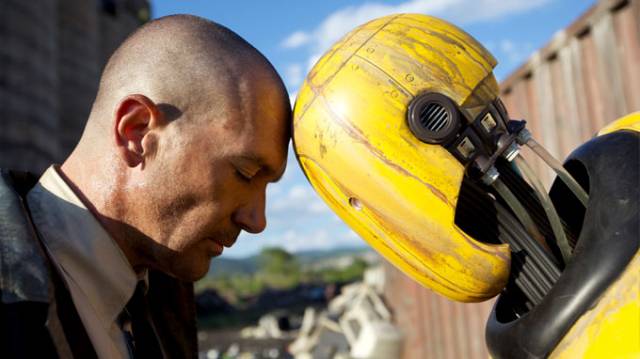
 The year is 2044; the vast majority of the earth has turned into a radioactive dessert wasteland. What remains is dark and wet—skylines overrun by neon and holographic billboards. As mankind begins to degrade, the development of the Automata Pilgrim 7000 is introduced—the first independently intelligent robot developed by ROC. To ensure mankind’s control over the robotic units, two protocols are placed in effect: the first, they cannot harm human life; the second, they cannot alter or repair themselves. When a rumor is spread that a group of robots have bypassed their protocols, Jacq Vaucan (Antonio Banderas), an insurance agent for ROC, is assigned to the case. What starts as a routine investigation of what appear to be empty claims, evolves into a life-shattering mission for Vaucan, where the boundaries between human and artificial life and good and evil are blurred.
The year is 2044; the vast majority of the earth has turned into a radioactive dessert wasteland. What remains is dark and wet—skylines overrun by neon and holographic billboards. As mankind begins to degrade, the development of the Automata Pilgrim 7000 is introduced—the first independently intelligent robot developed by ROC. To ensure mankind’s control over the robotic units, two protocols are placed in effect: the first, they cannot harm human life; the second, they cannot alter or repair themselves. When a rumor is spread that a group of robots have bypassed their protocols, Jacq Vaucan (Antonio Banderas), an insurance agent for ROC, is assigned to the case. What starts as a routine investigation of what appear to be empty claims, evolves into a life-shattering mission for Vaucan, where the boundaries between human and artificial life and good and evil are blurred.
This is the world of Gabe Ibáñez’s Automata; a beautiful blend of science fiction and film noir, the likes of which haven’t been since Ridley Scott’s 1982 masterpiece Blade Runner. While Blade Runner has become an almost impossible to escape reference point for the film, Automata manages to carve a place for itself even with its clear homage. There is more to Automata than meets the eye. The film utilizes popular tropes already well established in genre and spins them in a new light. Without revealing too much, the plot seems ripe for paradoxical problems regarding the protocols and AI intelligence, but Ibáñez, along with his co-writers, address these problems within the plot in convincing, unique manner. The film covers its tracks without falling victim to over-exposition (with the possible exception of the film’s opening).
It would be an oversight to not mention the film’s inconsistent acting styles. While the film sees one of Banderas’ finest performances in years, some of the supporting roles are not as strong. There is a two-dimensionality to many of the roles, especially the film's antagonists, their characters lacking depth and even exploding in scenes of melodramatic excess. However, while for many this oscillating flatness-excessiveness may be alienating, it appears more the result of intention than poor direction and bad acting. In particular, Dylan McDermott’s rather varying performance stands out among the rest. McDermott seems parodic, almost fake. Why, then, would Ibáñez choose to have his actors deliver their lines in a noticeable artificial manner? Simple, in juxtaposition their performances aid in giving the robots a heightened form of humanity. Automata works on the strength of the audience’s alignment with the robots and Ibáñez’s talent shines in his sympathetic depiction of them. Where other science fiction films rely on a robot design that is lifelike—dynamic facial features and all—Automata’s robots are barren of detail. Their faces don little resemblance to humans, and, as they grow closer to autonomy, their features move closer to the grotesque. The creation of sympathy comes, in principle, through the voice acting and dialogue.
The core of Automata is not a critique of AI, but a critique of humanity. Ibáñez’s promise as director is evident in his ability to breath life into the lifeless—to make us care about the plight of the Automata. Automata is not a perfect film, it has its rough spots, but produced for just a fraction of the budget of most blockbusters, Automata still emerges as of the year's strongest, smartest, and entertaining science fiction films.